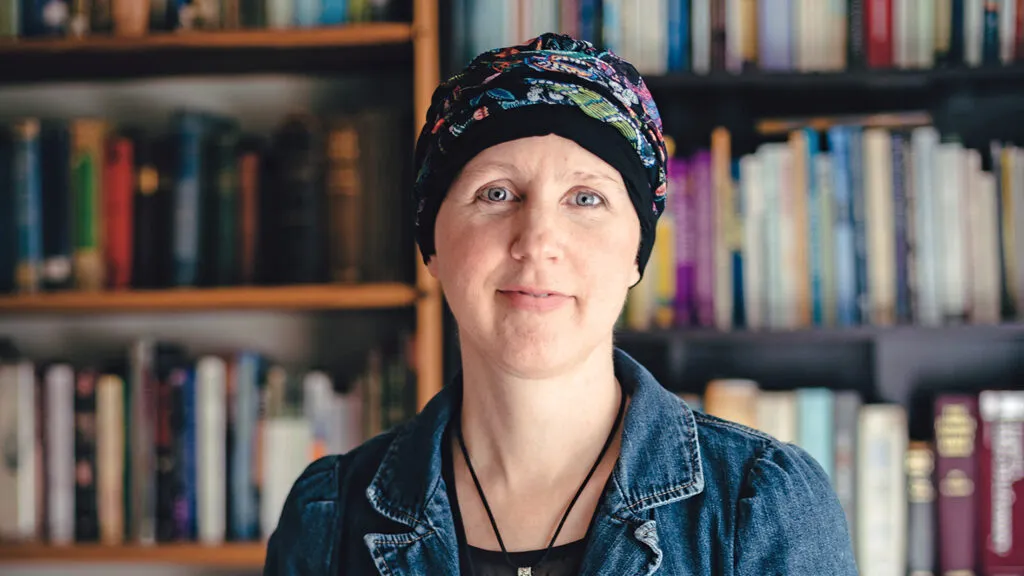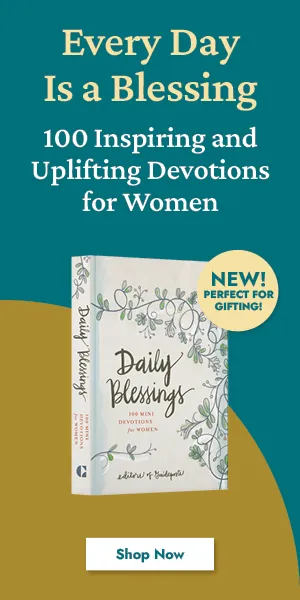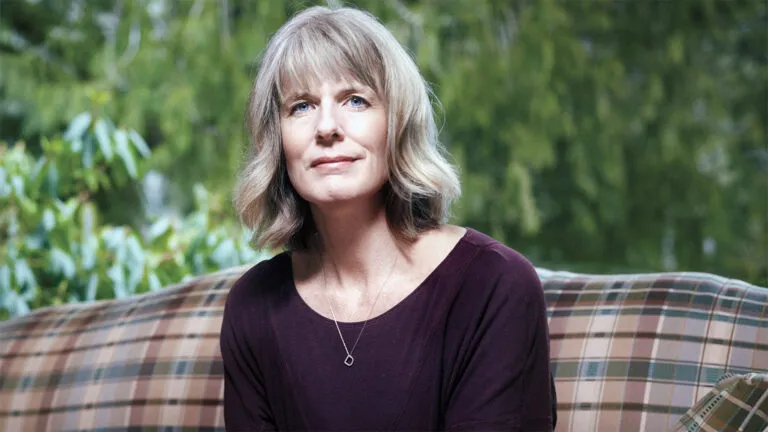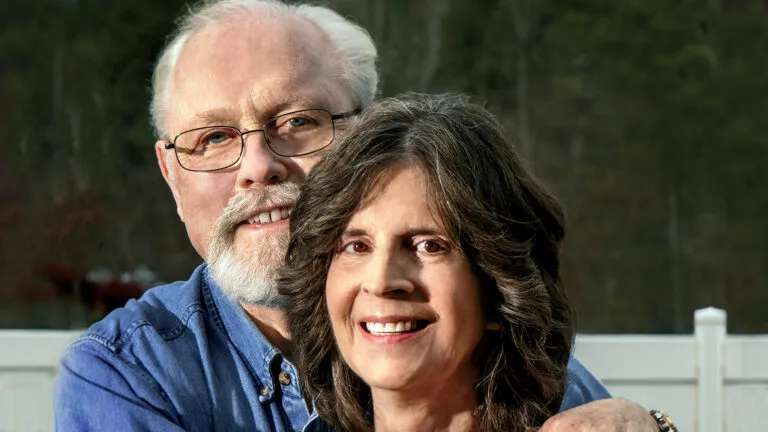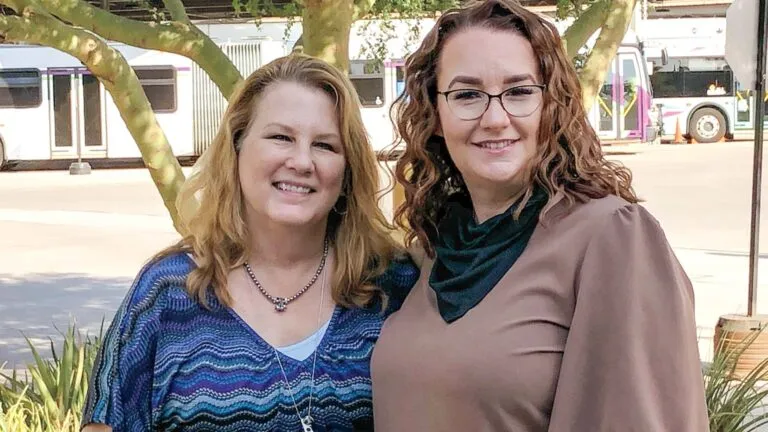I glanced warily at the IV bag hanging from the pole in my infusion bay. “Isn’t that the poison symbol?” I asked the nurse. He had donned a full gown, mask and gloves to hook up the chemotherapy drugs now coursing through my system.
“Yep,” he said. “We’re trained to handle these drugs carefully.”
“So I’m being poisoned,” I said, trying to joke.
“Basically.” He smiled, but his eyes were sad. “I’m sorry.”
When he left, I took a ragged breath, scared and angry. This was not where I wanted to be.
A year ago, life had been full. Sycamore Creek Church, the United Methodist congregation where my husband, Tom, serves as pastor in Lansing, Michigan, was thriving. Our two boys, ages four and seven, made for a lively household. I’d been offered the fantastic opportunity to write A Light So Lovely, a biography about Madeleine L’Engle, whom I’d long admired and who died in 2007. Her books for children, teens and adults sold in the tens of millions—most famously the Newbery Medal-winner A Wrinkle in Time, which in early 2018 became a Disney blockbuster. That same fall, Madeleine would’ve turned 100. It was a great year for a book about her spiritual legacy.
Then in May 2018, just as final revisions for the manuscript were due, I was diagnosed with Stage I breast cancer. “You’re looking at a left mastectomy,” my doctor told me. “I’d be surprised if you need chemo or radiation. Overall, a good prognosis.”
But things had not gone as expected. In a matter of weeks, my full and energizing life had collapsed into one frightening imperative: Survive.
My book was released in August, not long before I started chemo. Now, as I sat in the infusion center for my fourth round of treatment, powerful drugs pulsing through my veins, I found myself reflecting again on Madeleine’s wisdom and example. In a way, she’d been with me through this entire journey.
Here’s what she’d been teaching me:
When you are weak, God is strong.
At the turning point of A Wrinkle in Time, the main character, Meg Murry, has to return to a dark, dangerous planet to rescue her little brother. Her previous trip there nearly killed her. She balks at going again. She feels angry, frightened and unprepared. But ultimately it’s through those very weaknesses that she finds strength.
Shortly after my diagnosis, I needed Meg’s example. My mastectomy was scheduled for the following week. Tom drove me to the hospital. “How are you feeling about everything?” he asked.
“I’m ready,” I said. “I’m determined. I just want to get this over with.”
He took my hand. “Okay. Let’s go.”
After surgery, I went home, focused on healing. Then my surgeon called.
“The good news is, your lymph nodes are clear. The bad news is, your margins are not. You’ll need to come back for another surgery.”
I had been strong the first time. Now I was weak—in body and spirit. I wasn’t mentally or physically prepared for yet another blow to my system. I didn’t want to go back to the hospital, but I knew there was no choice.
Now I truly understood the challenge Meg faced. As Meg prepares for her second journey to the dark planet, one of her guardian angels sends her with these words: The foolishness of God is wiser than men; and the weakness of God is stronger than men. It’s an echo from 2 Corinthians, in which God tells the Apostle Paul, “My grace is sufficient for you, for my power is made perfect in weakness.”
I began to see that weakness is not failure. God will be strong for us.
It’s okay to be honest about the hard stuff.
In Madeleine’s memoirs The Summer of the Great-Grandmother and Two-Part Invention: The Story of a Marriage, she wrote honestly about her fears and anger in the midst of her mother’s dementia and her husband’s cancer. She admitted, “I cry out of fear for myself.” Like many of Madeleine’s readers, I found that kind of honesty not merely inspiring but freeing. Perhaps that could be a model for my own approach to cancer?
After my surgeries, the oncologist was direct. “The cancer hadn’t spread to your lymph nodes, but testing shows it to be very aggressive, which puts you at high risk for recurrence, ” she said. “Because you are so young, we recommend chemotherapy.”
Tom and I were devastated. We’d been looking forward to a fun summer with the boys while Tom took a long-planned sabbatical. Instead I would have to poison my body, suffer demoralizing side effects such as hair loss and pull back on the activities I enjoyed—all while recovering from surgery.
I wanted to be brave for my family, congregation and readers. But again Madeleine had taught me something important. She gave me permission to tell the truth about cancer, to be angry—even angry at God. She gave me words for sharing what going through chemo was really like.
Just after my third treatment, I took a picture of myself at the infusion center and posted it on social media. My bald head was covered with a chemo cap; I wore a mask to protect my diminished immune system from infection. My eyes above the mask were tired, my thinning brows furrowed with fatigue. It was a not a triumphant image of someone conquering cancer.
“I would take sanctification really any other way, to be honest,” I wrote. “Yet God is still rolling away stones for us in this irrational season, and our human dignity is not for the taking.”
The responses I received astounded me. One friend wrote, “Your posts are the kind of real I crave in the noise of the current world. Thank you for being brave and true enough to share glimpses of your journey.” I had learned from Madeleine to be honest about the hard stuff—and that such honesty was okay.
Redefine what it means to be well.
A theme that cropped up repeatedly in Madeleine’s writings about dark times was a quote from fourteenth-century Christian author Julian of Norwich: “All shall be well, and all shall be well, and all manner of things shall be well.”
In The Rock That Is Higher: Story As Truth, Madeleine tells of how she was once some 3,000 miles from home, on her way to a speaking engagement, when a truck smashed into the car and almost killed her. She was 72 years old, flourishing in a career that had spanned five decades. She had lost her husband several years earlier. Her children and grandchildren were launched in the world. She was, as she later said, as ready to go as she ever would be. As the medical team wheeled her down the hall to emergency surgery, she felt a strange calm, the clear sense that “all shall be well.” Even if she didn’t survive.
Unlike Madeleine, I wasn’t an aging author who’d already lost her husband and launched her offspring into the world. Throughout my chemo treatments, instead of repeating to myself, “All shall be well,” I thought, But I’m not done with life. Hovering in the back of my mind was the fear of cancer’s possible return. My faith in the happy ending had been rocked to its core.
Tom and I recalibrated our understanding of what it means for all to be well. Maybe a long life wasn’t the only definition. As Christians we’ve held to the promise that God has not designed the story of humanity to be, in the end, one big tragedy. God is at work even in our darkest times to bring hope, even if we don’t see the ultimate outcome.
Madeleine was a good example of how our current circumstances may feel dark—we may be walking in the valley of the shadow right now—but darkness doesn’t have the last word.
A cry for help is a cry of faith.
Leafing through the biography, I realized that “all shall be well” wasn’t the only truth Madeleine clung to in hard times. After her son, Bion, died of alcoholism in 1999, she didn’t mention that phrase at all—not that I could find. “Bion’s death has ripped the fabric of the universe,” she read from her journal on a PBS show. She told host Bob Abernethy that when suffering happens, “God comes into the equation. ‘Help.’ And we should never be afraid of crying out, ‘Help.’”
Over the six months of surgeries and chemo, our church family and neighbors stepped up to help us with everything from childcare to meals to lawn care. My doctor and several nurses even made house calls to help with things like checking my blood pressure. When I ended up in the ER for 12 hours due to a blood clot along the PICC (peripherally inserted central catheter), one family after another kept the boys busy, fed and loved—even overnight and into the next day—so my husband could be by my side. We learned to ask for help.
“Maybe the cry for help isn’t any less faithful than claiming that everything will turn out okay,” I told Tom. Madeleine had taught me that simply calling out to God is to acknowledge that God can help, that God does help. Just as we trusted our congregation to show up when we needed them, we could trust God to be there.
Recently I completed my final round of treatment. I’m grateful that Madeleine, from the depths of her own suffering, offered another option for how to cling to faith in dark times. Things may not turn out the way I’m hoping, in ways I’ve assumed they should be. But I can be honest about the hard stuff. I can be weak in the midst of God’s strength. The cry for help is a cry of faith, a beam of light in the darkness.
Madeleine L’Engle had given me exactly what I needed for the journey.
Read our Q&A with Sarah Arthur about Madeleine L’Engle.
For more inspiring stories, subscribe to Guideposts magazine.
